Iranians Chant Overnight Slogans, Set Khamenei Banner Ablaze
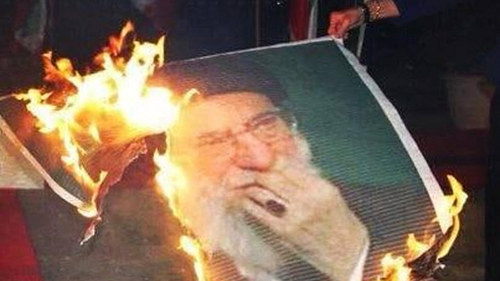
Iranians once again held anti-regime protests and engaged in acts of defiance in Tehran and other cities on Sunday.

Iranians once again held anti-regime protests and engaged in acts of defiance in Tehran and other cities on Sunday.
Several neighborhoods of capital Tehran once again witnessed overnight anti-government slogans by protesters.
People in Jannat Abad west of Tehran chanted slogans like “Death to the Dictator” and “Freedom, Freedom, Freedom” from inside their houses and residential complexes.
Baqeri town in the west of the capital, which is home to many IRGC staff, was also the scene of anti-government slogans. "Death to Khamenei", "Death to the IRGC" were among the nightly slogans of the protesters in this town.
Protesters in Ekbatan, west of Tehran, also chanted "Death to the dictator" and "Death to Khamenei". This comes as security forces set up checkpoints at the entrances of Ekbatan Sunday evening.
Despite the extensive arrests of residents Ekbatan has been one of the main hubs of protests in the capital since the beginning of unrest against the Islamic Republic after the death in custody of Mahsa Amini in September.
In Narmak neighborhood in the east, people chanted "Death to the dictator", "Death to the child-killing regime" and "Death to Khamenei, damn Khomeini".
In the cities of Rasht in the north and Bandar Abbas in the south, the protesters also wrote slogans on the walls, and in Yasouj in the southwest, they set fire to regime placards, including a large banner showing the image of Supreme Leader Ali Khamenei.
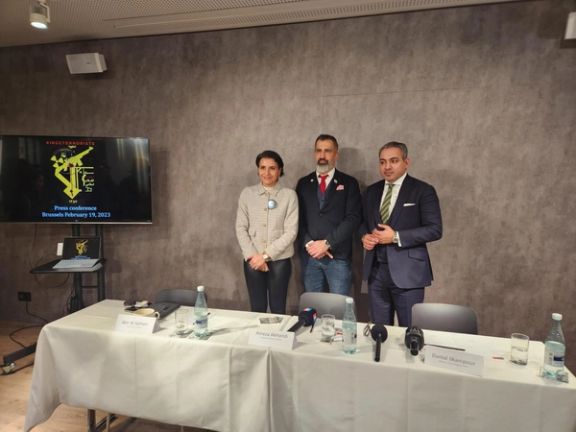
After a weekend of success for the Iranian opposition at the Munich Security Conference, dissidents are preparing a large rally in Brussels on Monday.
Prominent dissident figures spoke to Iranian expatriates as well as reporters on Sunday after the Munich Security Conference snubbed Tehran by not inviting regime officials this year.
A protest rally has been planned for Monday, February 20, outside the European Parliament in the Belgian capital Brussels to call on the European Union countries to designate the Revolutionary Guard (IRGC) as a terrorist organization. Thousands of Iranians from all over Europe held a massive rally in Strasbourg in January for the same purpose.
Speaking at an event on the eve of the Brussels demonstration a member of the Swedish parliament Alireza Akhondi expressed appreciation for the invitation extended to Prince Reza Pahlavi, and activists Masih Alinejad and Nazanin Boniadi to attend the Munich conference this year instead of Tehran regime officials.
Danial Ilkhanipour, a German-Iranian member of the Hamburg city parliament, and Iraqi-born Swedish Member of the European Parliament, Abir Al-Sahlani also spoke at the press conference. The three urged unity among the Iranian opposition, emphasizing that a united opposition can prompt the EU and countries around the world to put pressure on the clerical regime.
Iran International’s correspondent Mosaddeq Parsa said the gist of the event was to highlight the significance of designating the IRGC as a terrorist organization, which will further isolate the Islamic Republic and curb its destabilizing activities across the region and the world.
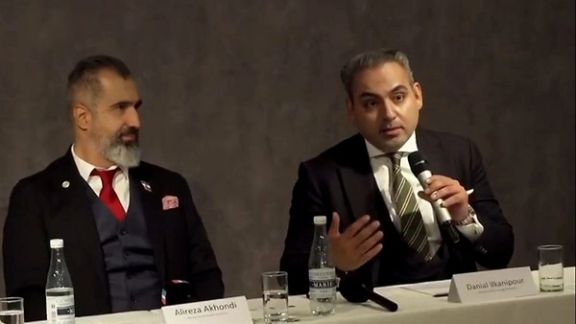
Akhondi touched upon the issue of regime threats against journalists at Iran International TV in London, which has caused the channel to temporarily relocate its studios to Washington DC. Akhondi that such threats are among the many reasons that European countries should list IRGC as a terror group.
"Declaring the Revolutionary Guards as terrorists is the finishing line of the Islamic Republic, that's why the intention of the Islamic Republic and the cyber army of the regime is to prevent our gatherings from growing bigger."
Al-Sahlani said that the IRGC is the cause of instability in the region and fuels military conflicts, adding that its designation by the European Union will lead to stability in the region. Everywhere in the Middle East where war, killing, repression and crime occur, traces of the Islamic Republic can be seen, she noted.
Earlier in the day, Alinejad appeared among the supporters of the exiled prince in Munich to reiterate solidarity of the Iranian opposition figures against the Islamic Republic. Pahlavi, who used to be seen as a solo actor determined to bring about the end of the Islamic Republic, has recently united with other top Iranian opposition figures with the same goal. Since a historic forum in Washington was held earlier this month, the dissident activists have been participating in events around the world to make the voice of the Iranian opposition heard. Such events signal the emergence of a leadership council in the diaspora to campaign for international support in favor of Iran’s protest movement.
According to Iran International’s correspondent in Munich, Ahmad Samadi, Alinejad also stressed the necessity of unity among all Iranians inside the country and abroad, regardless of differences to speed up the fall of the regime.
In an interview with Politico, Pahlavi called on the United States and Europe to help the Iranian people and the newly unified opposition exploit cracks in Iran’s leadership. Appreciating the sanctions already in place, he said that “The next level would be to target the Islamic Revolutionary Guard Corps to go after specific individuals and their assets abroad.”
“Frozen assets of the regime can be used, which is the Iranian people’s money. That money can be repurposed. We’re not asking for Germans to put money in the Iranian people’s pocket. It’s just a matter of making the decision to use the assets which are already there. I’m sure there should be some options of making exceptions to the sanctions to bring the money to the people, not to the dictator,” he added.
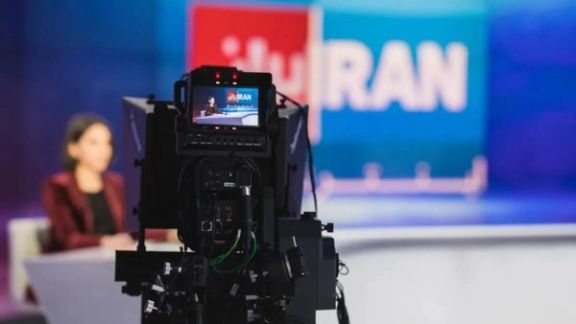
The announcement by Iran International TV that about shifting studio operations to Washington DC over Islamic Republic’s threats have solicited worldwide reactions.
After a significant escalation in state-backed threats from Iran and advice from the Metropolitan Police, Iran International TV announced February 18 that it has reluctantly closed its London studios and moved broadcasting to Washington DC.
The head of Counter Terrorism Policing (CTP), Assistant Commissioner Matt Jukes in London confirmed that they will continue to work closely with intelligence partners and others to investigate potential threats projected from Iran against a number of UK-based individuals, support those affected and put in place measures to keep them safe, including protective security measures such as an overt armed policing presence focused around the west London offices of the Persian-language media company.
“At its sharpest, this has involved police and MI5 working together to foil 15 plots since the start of 2022 to either kidnap or even kill British or UK-based individuals perceived as enemies of the regime,” read the statement.
Jukes added that in light of the ongoing investigation that follows the arrest of a man last weekend in that area, and despite extraordinary security measures, “we still have serious concerns for the safety of people working at this company,” referring to the arrest and charging of Austrian national Magomed-Husejn Dovtaev, 30, with allegedly “collecting information of a kind likely to be useful to a person committing or preparing an act of terrorism” at London’s Chiswick Business Park, home to the offices of Volant Media UK Ltd., the owner of Iran International.
“This news may also be of concern to members of the wider Iranian diaspora in the UK. If anyone has concerns over their own safety or the safety of somebody else, then they should contact their local police force,” the statement added.
But there were also some questions about why Britain would advise a media outlet to move out of London because of threats by a rogue state and if the move means giving in to threats. A former US State Department advisor, Gabriel Noronha tweeted: What on earth is “freedom of the press” good for if UK authorities won’t protect their own journalists from hostile states? This is the BASIC duty of a government!
The story has been widely covered by many media outlets, including The Sunday Times, Sky News, The Guardian, Daily Telegraph, Evening Standard, and LBC London radio, as well as several German and French papers and new websites.
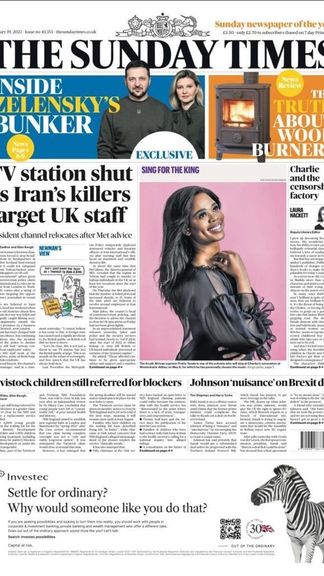
In an interview with BBC after the decision to move broadcasting to Washington, Mahmood Enayat, General Manager of Iran International TV, said, “I cannot believe it has come to this. A foreign state has caused such a significant threat to the British public on British soil that we have to move. Let’s be clear this is not just a threat to our TV station but the British Public at large. Even more this is an assault on the values of sovereignty, security and free speech that the UK has always held dear... We refuse to be silenced by these cowardly threats. We will continue to broadcast. We are undeterred.”
Iran International was warned by authorities in November that its journalists were under threat from Iranian agents and the Metropolitan Police took measures to strengthen security around the network’s office in the area.
The channel's broadcasts have gained special significance since popular anti-regime protests have swept Iran since September after the death of Mahsa Amini detained by the country’s "hijab police.” Iranian officials have repeatedly threatened Iran International and other Persian broadcasters based abroad since the start of protests when the government blocked the Internet to deny the population news and information. Iran’s Intelligence Ministry describes the channel as a “terrorist organization.”
“Its operatives and affiliates will be pursued by the Ministry of Intelligence,” Intelligence Minister Esmail Khatib said in November. “And from now on, any kind of connection with this terrorist organization will be considered to be tantamount to entering into terrorism and a threat to the national security of the Islamic Republic of Iran.”
In the same month, the broadcaster said the Metropolitan Police warned that two of its British-Iranian journalists faced threats from Iran that “represent an imminent, credible and significant risk to their lives and those of their families.”
Amid repeated threats by the Islamic Republic against Iran International’s reporters, the UK government vowed in December to step up protection of London-based Iranian journalists.
British Foreign Minister James Cleverly had vowed during a session in Parliament on December 13 that the Foreign and Commonwealth Development Office (FCDO), in partnership with the Home Office, had ensured that the Iranian journalists were protected by the British police.
“The UK remains absolutely determined to ensure that Iran does not intimidate people within this country. We will always stand up to the aggression from foreign nations,” he noted, adding, “We will absolutely not tolerate threats, particularly towards journalists who are highlighting what is going on in Iran, or indeed any other individual living in the UK.”
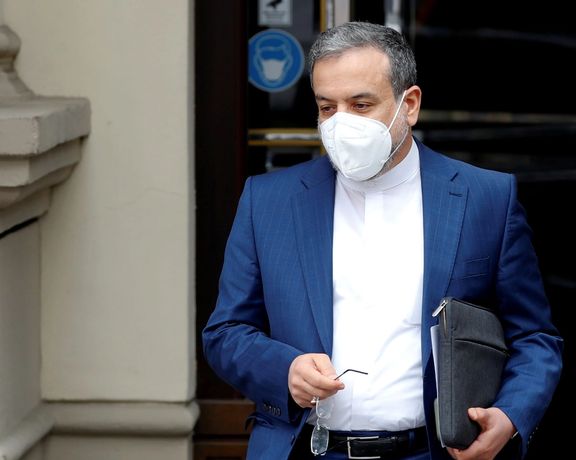
Iran’s former deputy foreign minister has warned government officials that they should not allow demonstrations be held against the Islamic Republic abroad.
Abbas Araqchi, who currently serves as the secretary of the Strategic Council on Foreign Relations, in an interview with Jamaran website on Saturday expressed concern about the worldwide protests.
He claimed "the project to defame and delegitimize the Islamic Republic in the world" is underway.
In the past several months, Iranians abroad have held demonstrations in many countries in support of the people inside the country.
Acknowledging that protests inside the country along with the ongoing protests abroad bring about "cost and pressure", he said “We have to deal with it. This affects our foreign relations and reduces our cooperation with other countries. It means they create an atmosphere where countries hesitate to cooperate with Iran.”
Iran’s former chief nuclear negotiator also added that the current atmosphere against the Islamic Republic is "very dangerous" and "affects" the interests of Tehran.
His concern about the protests abroad comes at a time when western countries are putting pressure on the regime to stop its gross human rights violations at home and its arms supplies to Russia. Relations between European countries and Iran have deteriorated since the bloody crackdown on protests. Security forces have killed more than 500 civilians since September.
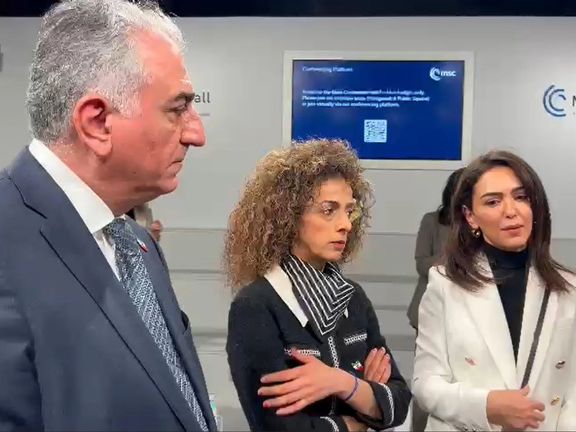
Iran’s exiled Prince Reza Pahlavi says the Iranian delegation at Munich Security Conference is the "message bearer" of the people to the international community.
In an interview with Radio Farda, the Persian Service of Radio Free Europe in Prague, Reza Pahlavi, who is invited to the conference this year instead of Tehran regime officials, stated “the delegation is present in Munich to "convey the will" of the Iranian people, including civil activists, political prisoners, and people who are under pressure and cannot express their positions freely.
Women’s rights activists Masih Alinejad and British-Iranian actress and human rights activist Nazanin Boniadi are the other opposition figures accompanying Pahlavi.
The conference, which has not invited officials from Russia and the Islamic Republic of Iran this year, kicked off Friday and concludes February 19. Many Iranians residing in the city also held a gathering outside the venue of the event on Friday to support the dissident figures.
Pahlavi said these people "want us to convey their message to the world. This is our duty and mission."
Meanwhile, Natalie Amiri, a journalist of Iranian descent in Germany, in a conversation with Prince Reza Pahlavi, asked him about the importance of unity among Iranians abroad.
In response, Reza Pahlavi said “if we do not have unity now, we will not effectively support our compatriots inside the country.”
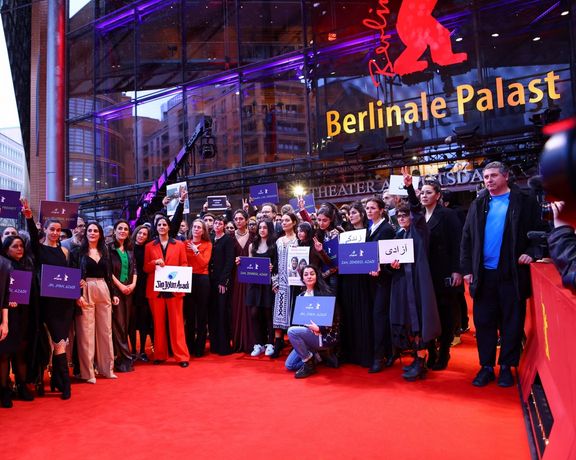
Dozens of actors and filmmakers gathered on the Berlinale's red carpet on Saturday to show solidarity with anti-government protesters in Iran.
An exiled Iranian film director predicted the imminent fall of the country's government.
"The regime's time is over," Sepideh Farsi told Reuters on the red carpet. "It's time for change – I think people really grasp that."
Some of those present at the demonstration – including Farsi, whose animation film "The Siren" opened on Thursday, and the award-winning director Farzad Pak – held up placards emblazoned with the Kurdish revolutionary slogan "Jin, Jîyan, Azadî" (Woman, Life, Freedom).
Others made victory signs or chanted the slogan as they punched the air with their hands.
The demonstration in Berlin came after protests flared up overnight on Thursday in Iran, with streets in a number of cities filling with people demanding the overthrow of the Islamic Republic.
The Berlinale has this year boycotted Iranian film institutions but is showing a number of films by independent directors from the country, with Iran's quest for freedom one of this year's main themes.
Banning Iranian institutions sent "a very strong signal," Farsi added. "Iranian institutions have always been here; their absence opens the place for other independent institutions."
The demonstration followed a panel discussion exploring the role of the arts in the protests, during which Pak described the government as a "totalitarian regime where self expression is not allowed".
Iranian director Jafar Panahi, who has been critical of the government, was arrested in Iran in July. He was released on bail earlier this month.
Reporting by Reuters